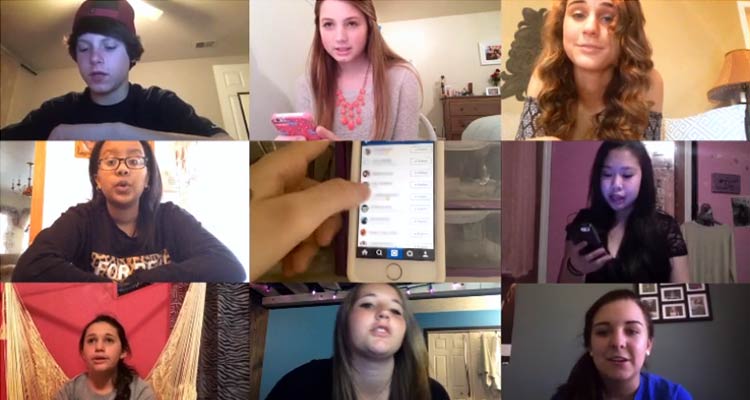CNN’s special report that aired Monday night, #Being13: Inside the Secret World of Teens, is sparking considerable thought and discussion about social pressures facing today’s teenagers, amplified by the fact that every move they make can be disseminated to and dissected by online peers.
The report lends insight into the world of cyberbullying, something K12 is striving to eradicate with its #ZeroBullying campaign during October, which is National Bullying Prevention Month.
CNN concluded: “Most adolescents with access to smartphones are living their social lives online as much as they do face-to-face. Adults worry that teens are hooked on social media, but most have no idea what teens are actually doing online.”
The level to which teens rely on their phones for social interaction is reflected by comments from more than 200 eighth graders across the U.S. that CNN interviewed. CNN evaluated (with parental permission and use of a secure server) more than 150,000 individual social posts on Twitter, Facebook, and Instagram across a period of six months. Participating students also answered survey questions about their use of social media.
CNN found that the heaviest social media users checked their social media feeds more than 100 times a day, often during school hours. Sixty-one percent said they wanted to see if their posts were getting likes or comments. Those numbers are troubling, according to the study, because the more teens look at social media, the more “distressed” they can become.
But it’s not only how frequently things are being said, it’s the content of the social media messages that can adversely impact teens, sometimes taking the form of cyberbullying. #Being13 also studied the parents of participating teens and found that 94 percent underestimated the amount of fighting that takes place on social media.
#Being13 found that teens feel empowered to post comments—often negative—that they would not consider saying in person to one of their peers. As one teenager Emmy put it: “I don’t like dealing with things face-to-face because it’s really easy to hide behind your phone.”
The study’s analysts were alarmed that messages from eighth graders often included profanity and references to sexual activity and drug use. Fifteen percent of teens reported receiving inappropriate photos.
“Receiving these pictures is upsetting, especially at such a young age, because it’s something you didn’t ask to see, it’s something you may have wished you did not open, but you can’t erase it out of your mind,” said child clinical psychologist Marion Underwood. “It’s illegal, it’s worrisome, it’s scary, it’s dangerous, it’s loaded. If you tell an adult, everybody will get in a lot of trouble. So I think it puts them in a really tough position.”
CNN reported: “Some teens are so vigilant about those who might be casting them in a negative light, they follow the social media accounts of not only their friends but also their enemies.” Said Zack, who participated in the study: “I want to see what they’re talking about and if they’re talking about me. Because if they’re talking about me, I’m going to talk about them.”
“It’s a very subtle form of bullying,” said CNN news anchor Anderson Cooper. “It’s done so strategically, and it’s so painful. A lot of parents might not realize it’s going on.”
Still, teens said they would rather be grounded or similarly punished than live without their cell phone.
“I would rather not eat for a week than get my phone taken away. It’s really bad,” said Gia, 13. “I literally feel like I’m going to die.”
“When I get my phone taken away, I feel kind of naked,” said Kyla, also 13. “I do feel kind of empty without my phone.”
“We see a lot of evidence of, if not outright addiction to social media, a heavy dependence on it,” said sociologist Robert Faris, a school bullying and youth aggression researcher and co-author along with Underwood of a 20-page report. “There’s a lot of anxiety about what’s going on online, when they’re not actually online, so that leads to compulsive checking. . . . Parent monitoring effectively erased the negative effects of online conflicts,” Faris noted.
The CNN study concluded that many teens spent considerable time “lurking” or reading the posts from others than actually posting themselves. But when students see photos of their peers in social gatherings—particularly events to which they might not have been invited—they often feel left out. Thirty-six percent said they used social media to see if their friends were doing things without them.
Social media thus becomes a measuring tool for social status.
“It’s like an instant barometer of popularity,” Cooper said. “The study found a correlation between lurking and levels of stress among the teenagers. . . . We get a sense of just how stressful it can be for teens to be aware of where they are on the social hierarchy. For a lot of these eighth graders, their social life is 24/7.”
Among those checking in with a response to #Being13 was entertainer Cher, who Tweeted: CANNOT IMAGINE BEING AFRAID OF CYBER BULLIES, MAKING SURE SELFIES ARE PHOTOSHOPPED TO PERFECTION, PRAYING FOR “LIKES”….#being13
______________________________________________________________
Featured Image via CNN





































